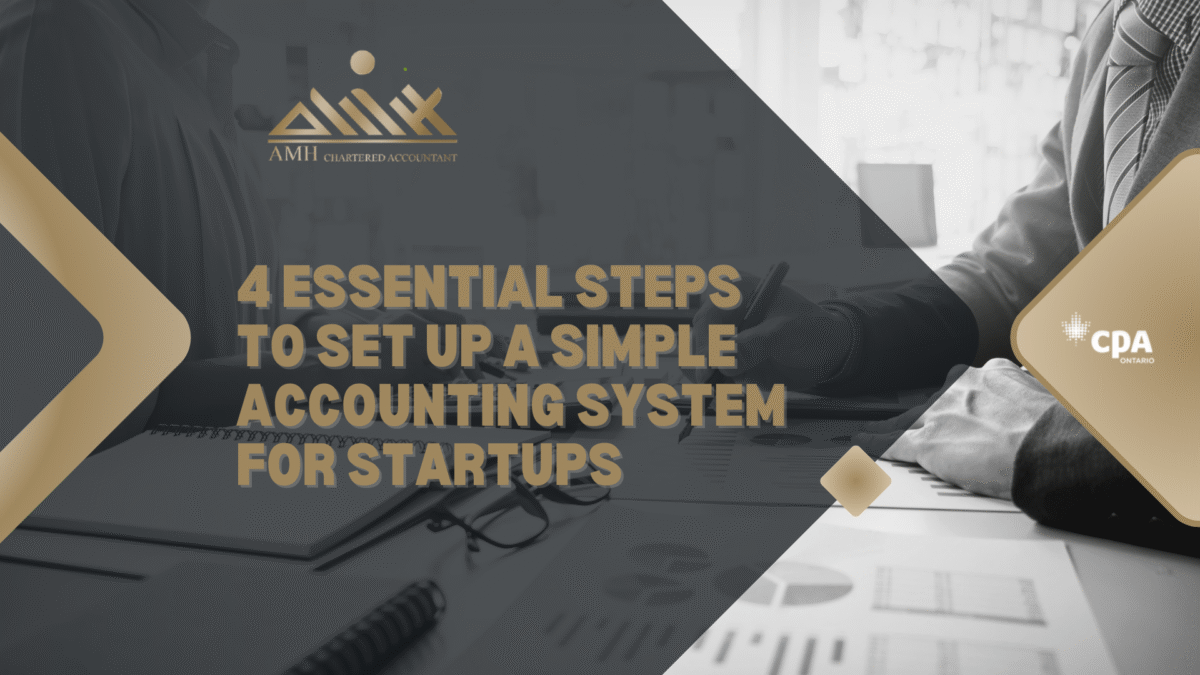
Accounting for R&D Projects: How to Maximize Tax Benefits
June 3, 20254 Essential Steps to Set Up a Simple Accounting System for Startups
Simplify and scale with confidence using these proven accounting strategies designed specifically for startup success.
Introduction to Startup Accounting
When launching a startup, excitement often centers around innovation, product development, or market disruption. But behind every thriving startup is a strong financial backbone—specifically, a well-structured accounting system. At AMH Chartered Professional Accountant, we understand the growing pains new businesses face and offer tailored accounting solutions across Toronto and the GTA, including Milton, Oakville, Hamilton, Kitchener, and Waterloo.
Let’s explore how to set up a simple yet effective accounting system in four essential steps, ensuring your startup gets off the ground with financial clarity and confidence.
The Importance of a Simple Accounting System for Startups
Why start simple? Because complexity early on can lead to chaos later. Startups typically operate with limited resources, and any misstep in accounting—be it tax filing or cash flow tracking—can spiral into bigger issues. A simple accounting system ensures you stay compliant, manage your budget, and understand where your money is going—all crucial for survival and growth.
Understanding Your Startup’s Financial Needs
Each startup is different. Some begin with funding, others bootstrapped. Some need inventory management, others track service hours. Before choosing tools or processes, you must understand your financial environment. Ask:
What are your revenue streams?
Will you pay contractors or hire employees?
Do you deal with international clients or taxes?
This assessment helps design a system that fits—not one-size-fits-all.
Identifying Key Business Goals Early On
Are you aiming to attract investors? Prepare for an acquisition? Keep things lean? These choices determine what data you’ll need from your accounting system. AMH Chartered Professional Accountant helps clients align their financial systems with strategic goals, ensuring smart long-term planning.
Choosing the Right Business Structure
Your legal entity—sole proprietorship, partnership, or corporation—affects tax filings, liability, and accounting needs. Corporations, for example, must maintain detailed records and comply with more stringent tax requirements. We guide startups through structuring decisions based on their industry and growth plan.
Complying with Canadian Accounting Standards
In Canada, startups must follow Generally Accepted Accounting Principles (GAAP), along with CRA tax requirements. GST/HST filings, payroll deductions, and provincial obligations vary. The AMH team ensures your system meets all regulatory requirements.
Deciding Between Cash and Accrual Accounting
Cash accounting is simpler—record when money changes hands. Accrual accounting recognizes income and expenses when earned or incurred. Most startups start with cash basis but may transition to accrual as they scale. We help you decide based on your business model and CRA mandates.
Step One: Define Your Startup’s Accounting Objectives
A startup’s accounting system should serve more than taxes—it should offer insights. Ask yourself:
Do you need investor-ready financial reports?
Will you budget monthly or quarterly?
Are KPIs like customer acquisition cost or burn rate important?
Your objectives shape what you track and report.
Why Objectives Drive Financial Clarity
Without goals, it’s easy to drown in spreadsheets. Clear accounting goals lead to clean data, which informs smarter decisions. Whether you’re raising capital or managing a lean operation, clarity is key.
Mapping Out Short-Term and Long-Term Financial Goals
Set milestones: three-month cash runway, annual revenue targets, profit margins, etc. Tracking these requires a structured approach to bookkeeping, one AMH specializes in designing for startups.
Step Two: Choose the Right Accounting Software
You need tools that save time, reduce errors, and grow with you. Cloud-based solutions dominate the market, but picking the right one depends on your budget, team size, and complexity.
Features Every Startup Accounting Tool Should Have
Look for:
Bank reconciliation
Invoicing and receipt tracking
Expense management
Multi-user access
Integration with payment platforms (Stripe, PayPal)
Comparing QuickBooks, Xero, FreshBooks, and Zoho Books
| Software | Best For | Key Features |
|---|---|---|
| QuickBooks Online | General-purpose use | Payroll, bank sync, customizable reports |
| Xero | Growth-ready startups | Unlimited users, multi-currency support |
| FreshBooks | Service-based startups | Time tracking, project invoicing |
| Zoho Books | Budget-conscious users | Automation, CRM integration |
Integrating Your Software with Banking and E-commerce
Avoid manual errors. Sync your accounting tool with your bank, Shopify, or Amazon seller account. AMH helps startups automate data flow to reduce workload and boost accuracy.
Step Three: Establish Core Accounting Processes
Even the best software won’t help if processes are missing. Create routines for recording, reviewing, and reporting.
Bookkeeping Basics for Startups
Track:
Sales and income
Expenses and purchases
Assets and liabilities
Set aside time weekly for entries—or let AMH do it for you.
How to Manage Invoices and Receipts
Keep everything digital. Use tools like Hubdoc or Expensify to snap photos and upload receipts. Invoices should include due dates, terms, and clear itemization.
Setting Up Payroll the Right Way
Hiring your first employee? You need a payroll account with the CRA, deduction tracking, and T4 filing. AMH offers payroll setup and management, keeping you compliant from day one.
Tracking Business Expenses Efficiently
Categorize expenses properly (meals, travel, software). This helps at tax time and improves financial analysis. Avoid mixing personal and business expenses—use separate accounts.
Step Four: Set Up Internal Controls and Monitoring
Startups often overlook controls, but they’re critical. They reduce fraud, catch errors early, and build investor trust.
Why Internal Controls Matter Even in Small Teams
Even with a two-person team, establish who approves payments, who records them, and who reviews bank statements. AMH helps design simple, enforceable controls.
Scheduling Regular Financial Reviews
Check cash flow weekly. Review reports monthly. Plan quarterly budgets. Financial hygiene prevents crises and supports agile decision-making.
Reconciling Bank Accounts Monthly
Ensure your software matches your actual account balance. Monthly reconciliation catches unauthorized charges or forgotten expenses.
Working with a CPA or Accounting Firm
Partnering with a firm like AMH provides peace of mind. From tax optimization to audit prep, we become your trusted financial partner.
When to Outsource Your Accounting Needs
If accounting steals time from core business, it’s time to outsource. AMH offers flexible, affordable packages for startups in any stage.
How AMH Chartered Professional Accountant Supports Startups
We provide:
Customized setup and training
Bookkeeping and payroll
Tax planning and filing
Financial forecasting
Competitive pricing and free consultations
Conclusion: Simplifying Your Financial Journey
The journey of building a business is tough enough—your accounting system shouldn’t be. With a clear roadmap and expert support, you can build a system that supports your vision, attracts investors, and keeps you out of trouble with the CRA. Contact AMH Chartered Professional Accountant today to simplify your financial journey.
FAQs
Do I need accounting software from day one?
Yes. Even basic software can prevent future headaches and simplify tax season.
How much does it cost to hire an accountant?
AMH offers competitive pricing with custom packages for startups, starting with free consultations.
Is it okay to manage accounting on my own?
Initially, yes—but as complexity grows, professional help becomes necessary.
How do I know if I’m CRA compliant?
AMH performs audits and compliance checks to ensure your books meet CRA standards.
When should I switch from cash to accrual accounting?
When you scale, bring on investors, or sell on credit, accrual becomes necessary.
Can I get help with tax deductions for startups?
Absolutely. AMH helps identify all eligible deductions to reduce tax liabilities.




